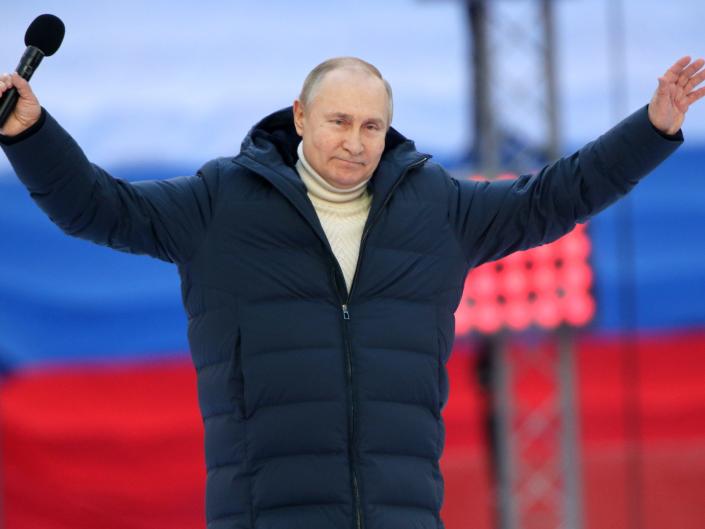
-
Despite sanctions, Putin’s regime has been holding up, as the country is a commodity powerhouse.
-
Energy prices have surged since the war in Ukraine and the EU still can’t do with Russian gas.
-
Russian oil and gas sales could hit $285 billion this year — outstripping last year’s takings by 20%.
Russia has been hit with intensifying sanctions ever since it invaded Ukraine — but Moscow could still rake in $800 million a day from oil and gas revenues this year amid soaring energy prices, according to Bloomberg Economics.
President Vladimir Putin’s regime has been holding up so far as oil prices have risen about 50% this year and are at 13-year highs. The gains could bring Russia’s oil and gas sales to total $285 billion this year, Bloomberg forecasts. This is 20% higher than the country’s $235.6 billion takings from oil and gas in 2021.
The European Union’s (EU) reliance on Russian energy is contributing to Moscow’s windfall, as the bloc gets about 40% of its natural gas from the country.
On Monday, the EU agreed to slash 90% of Russian oil imports to the bloc by the end of 2022 — but some countries in the group, including Germany, Europe’s largest economy, continue to be heavily dependent on Russian gas and have caved in to Putin’s demands to pay in rubles. This is in turn driving up demand for the Russian currency, which has become the world’s top-performing currency against the US dollar this year so far.
Meanwhile, countries like China and India are buying discounted Russian oil, further undermining international sanctions.
Notably, that forecast $800 million a day windfall is from energy alone. Russia is also a major producer of other commodities like wheat and metals such as palladium and platinum.
The country’s earnings from the raw materials trade are likely to exceed $300 billion this year, per Bloomberg Economics. This could offset the same amount in Russia’s foreign reserves that have been frozen under international sanctions.
Russia’s gains from the commodities rally predate the war as prices of raw materials have been on the up due to supply-chain challenges and recovering demand as pandemic restrictions ease. Russia’s invasion of Ukraine worsened trade dislocations and pushed up prices even more as the two countries are key commodity exporters.
“If the goal of sanctions was to stop the Russian military, it wasn’t realistic,” Janis Kluge, a senior associate for Eastern Europe and Eurasia at the German Institute for International and Security Affairs, told Bloomberg. “It can still fund the war effort, it can still compensate for some of the damage sanctions are doing to its population.”
Read the original article on Business Insider




